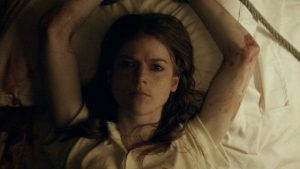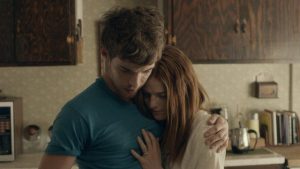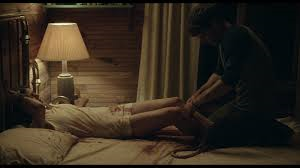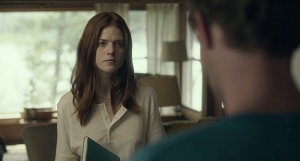Take It Out: The Horror of Pregnancy in Honeymoon
Leigh Janiek’s directorial debut, Honeymoon, tells the story of couple Bea (Rose Leslie) and Paul (Harry Treadaway), whose honeymoon is interrupted by growing concerns over Bea’s strange behavior. Paul is concerned that Bea has possibly been sexually assaulted by former childhood friend Will (Ben Huber). I’ve heard it argued that the film can be interpreted as a statement on the need for ownership over a female partner’s body once the institution of marriage has been entered. However, Janiek and co-writer Phil Graziadei weave a more subtle theme into the film from the very beginning: Bea begins to lose her identity once the notion of pregnancy enters into the conversation, an issue that increasingly robs Bea of her autonomy.

Lie back and think of England, Bea.
A good ten minutes into the film, Janiek and Graziadei tease this concept to the audience by having Paul and Bea discuss it in typical newly-married couple fashion. After a night of intense sex, Paul tells Bea to “rest your womb.” The wording throws off Bea, who finds the diction choice a push toward maternity. Worriedly, she asks, “Do you want to have a baby?” Paul assures her, “I was teasing about how hard I fucked you.” Bea, however, isn’t having it, and sulks away quietly to stare out the window. When pressed, she tells Paul, ‘I don’t know if I’m ready to have a baby.” Here’s the kicker: Paul explains, “Right now, I think we should just be on our honeymoon.” While it’s commendable that Bea is both assessing her feelings on immediately reproducing with her husband, it’s more than a little troubling that Paul seems to be the one who’s in charge of the decision. It’s him that brings up the notion of potential pregnancy with word choice that implies that her uterus needs to rest after sex, as though preparing for a fertilized ovum; after all, it’s not her vagina that requires a breather after a pounding, it’s the organ that will presumably carry their child. Leslie’s body language as Rose is telling as well: she looks up at Treadaway’s Paul with concern and nervousness when she tells him that she doesn’t know if she’s ready to become a mother. The decision is not with her; while it’s great that she’s involving her partner in a conversation regarding their mutual reproduction, it comes off as Bea seeking validation for her own feelings on maternity. That’s more than a bit disconcerting, as it implies that Bea is incapable of making decisions for her own body.

Well, at least she doesn’t have to make him breakfast.
From here, the audience gets misled a little bit concerning the great mystery of What Happened to Bea in the woods: we’re led to think that she’s been raped in the middle of the night by childhood friend Will, when she’s actually been impregnated with an alien worm. The symptoms are equally troubling to us as they are to Paul: Bea mixes up her language (such as saying “take a sleep” over “take a nap”), can’t remember key details of their courtship, has deepening bruises on her upper thigh, and will not allow Paul to initiate sex with her. For his part, Paul finds her ripped nightgown in the woods covered in a clear, sticky substance, and notices that she’s taken to writing the same phrases over and over again in a notebook. The phrases are ones of self identity: “My name is Bea. My husband is Paul.” Bea, meanwhile, continues to avoid sex, and actively begins bleeding when her husband attempts to finger her in a boat. For all intents and purposes, Bea displays symptoms of post traumatic stress disorder as a result of rape. We’re with this line of thought all the way up through her locking herself in the bathroom, where she begins to stab herself in the vagina. As the blood gushes forth, we know that something is horribly wrong, which makes it that much worse when Paul ties her to the bed in what appears to be a terrifying loss of control over her mind as well as her body: we’re scared as an audience that this woman is about to be raped again with the way that she’s tied to the bed. At this point, we know that she’s losing herself and now is at risk of losing complete control of her body over her husband; it’s when she tells him, “Take it out” that it suddenly dawns on us that she’s housing something inside of her that’s making her this way. And so Paul reaches into her vagina and pulls out a long, slippery worm-like creature that snaps to attention before dying on the bed next to her. Mystery solved: Bea is losing herself because she’s knocked up with an alien creature that has been stealing her mind and causing her body to deteriorate.

My girly bits still hurt after watching everything that happened before this moment.
Bea essentially loses herself when she becomes pregnant, a fact hidden in plain sight from the beginning of the film. One of the most subtle pieces of foreshadowing comes when Bea and Paul are lying in bed together on the first night of their honeymoon: after Paul remarks that the duck decorations are creepy, Bea assures him that they’re just hollow. Later, she removes a piece of paper that proclaims a message to any real ducks: the wooden duck is a fake trying to fit in, attempting to translate the message into duck language. This mimics Bea’s own fate: after being hollowed out, attempts are made to connect to the outside world by impersonating a similar life form. As such, Bea attempts to “hide” Paul in a similar fashion to the way that she hid the message in the duck as a child. In direct parallel, Bea becomes the hollow vessel for the worm-like creature she carries, squirreling away the man she loves while becoming a shell of her former self.

My name is Bea…
The things this says about impending maternity in a state of matrimony are, in a word, terrifying. The physical and mental transformation of Bea is alarming. We know right away that something is wrong with her because she can’t remember even the basic order of words. She begins to pull away from a loving, affectionate relationship, which is then replaced by suspicion and claims of ownership. After a while, Paul continually demands, “Where is my wife?” Not “where is the woman I love” – he asserts through careful wording that she is a nameless entity that fits into the label of female marriage partner. “My wife cries,” he tells her when she’s tied to the bed. “My wife doesn’t act like this. She tells me everything. She tells me the truth.” Again, careful wording – she’s no longer Bea, but “my wife.” Once Bea enters into a marriage contract and becomes pregnant, she not only stops being herself to her husband, but to herself as well. Bea literally fades away in front of us as her skin flakes and her eyes turn yellow. Let me tell you, as someone who’s watched women completely lose their identities once they become wives and mothers… this is pretty spot-on criticism. The societal expectation of sacrificing the female identity in order to become a mother is a very real thing, and if you don’t believe me, listen to an overwhelmed new mother have a breakdown over everything ranging from work-guilt to an inability to connect to friends that don’t have children. It will break your heart to watch a woman crumble in front of your eyes like that, and yet there’s a social contract that once a child enters into the picture, body and mind must be sacrificed in order to ensure its survival. That this is placed in the context of a married woman who voices her concerns over delaying motherhood is no accident. Bea’s pregnancy is frought with anxiety, physical harm, and loss of autonomy. This is a worst-case scenario that places into body horror context what some women fear when it comes to motherhood.

… my name is Bea…
The final words of the film are chilling: “Before I was alone. Now I’m not.” In essence, Bea is alone: she’s no longer herself, with every tiny shred of her identity ripped out of her. She’s a shell functioning under a type of mind control. Despite that she has the company of Annie, she’s isolated from that which she loved while unwillingly having carried spawn that forced a massive physical and psychological change. If that’s not a searing therapy session regarding the physical changes and mental anxieties of losing your body to become a parent, I don’t know what is.
